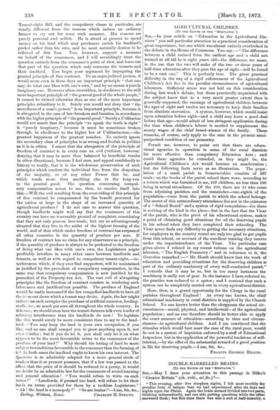AGRICULTURAL CHILDREN.
[TO THE EDITOR OF THE SPECTATO3.7]
SIR,—In your article on "Education in the Agricultural Dis-
tricts" you call particular attention to a practical consideration of great importance, but one which was almost entirely overlooked in the debate in the House of Commons.. You say:—" The difference between a child trained from the earliest age and a child not trained at all till he is eight years old—the difference, we mean, in the use that the two will make of the two or three years of half-time education after they pass the age of eight—will be forma to be a vast one." This is perfectly true. The great practical difficulty in the way of a rigid enforcement of the Agricultural Children's Act lies in the peculiar circumstances of agricultural
labourers. Sufficient stress was not laid on this consideration during last week's debate, but those practically acquainted with the subject know that to a very much greater extent than is. generally supposed, the earnings of agricultural children between the ages of eight and twelve are necessary to keep their families. from absolute starvation. A system, however, which would insist upon education before eight—and a child may learn a good deal before that age—would admit of less stringent application during- the time when children's labour is needed to supplement the- scanty wages of the- chief bread-winner of the family. These- remarks, of course, only apply to the case in the present .semi- pauperised condition of our peasantry.
Permit me, however, to point out that there are educa- tional agencies in operation in some of the rural dietricts far more effective than compulsory Education Acts; ..and could these agencies be extended, as they might be, the Agricultural Children's Act would become an anachronism but the following facts serve as an illustration. The popu- lation of a small parish in Somersetshire consists of 467 souls ; on the books of the parish school there were, according to a return which was furnished to me, 109 children, no less than 100 being in actual attendance. Of the 100, there are 41 who come from adjoining parishes, and the remainder—one-eighth of the population—come from the parish to which the school belongs. The secret of this extraordinary attendance lies not in the existence of a "School Board" and a system of rigid compulsion—for there is nothing of the kind in the place—but in the fact that the Vicar of the parish, who is the pivot of his educational system, makes a point of obtaining good situations for all the deserving pupila in his school when they have completed their schooling. The Vicar never finds any difficulty in getting the necessary situations, for employers in the country round are only too glad to get pupils from this school, on account of the excellent training they receive under the superintendence of the Vicar. The particular case given above I related in my recent volume on the agricultural labourer, "The English Peasantry ;" and in reference to it, the Guardian remarked :—" Mr. Heath should know that the work of education and providing situations for the deserving children is- part of the ordinary machinery of every well-conducted parish." I concede that it may be so, but in too many instances the machinery is sadly out of gear. In the instance I have referred to, the practice was reduced to a system; and I contend that such a system can be completely carried out in every agricultural district..
Here, then, is a grand opportunity for the Clergy in the rural parishes throughout England ! As every one knows, the chief educational machinery in rural districts is supplied by the Church School. No one knows better than the clergyman the actual cir- cumstances—moral, physical, and intellectual—of the agricultural population ; and no one therefore should be better able to apply- the exact measure of education—according to time and circum- stances—to agricultural children. And I am convinced that the stimulus which would best meet the case of the rural poor, would lie not in a system of impulsion enforced by a staff of Educational Inspectors, but in the application of the powerful loadstone of self- interest,—by the offer of the substantial reward of a good position in life for deserving pupils.—I am, Sir, &c.,
FRANCIS GEORGE HEATH..


































 Previous page
Previous page